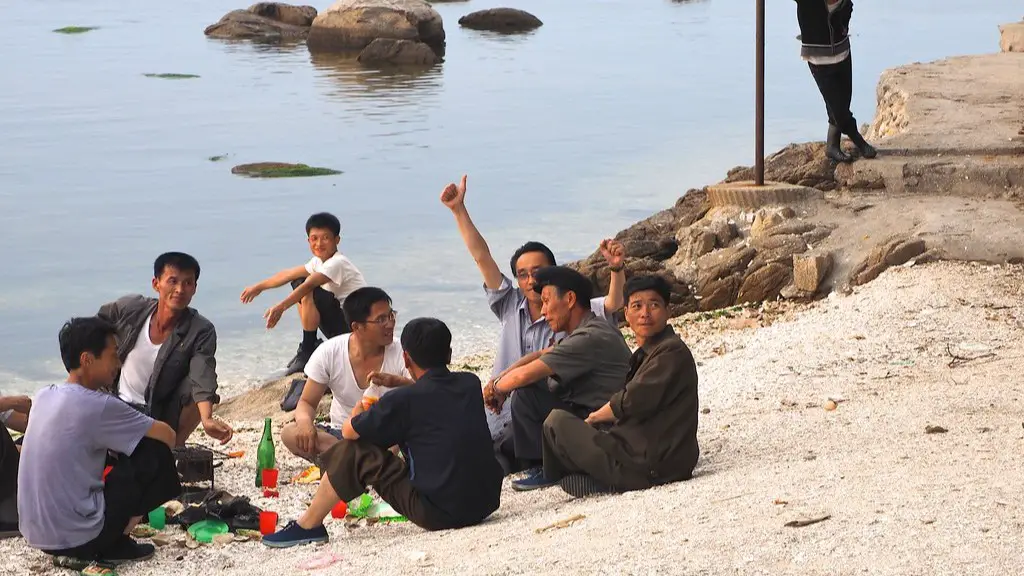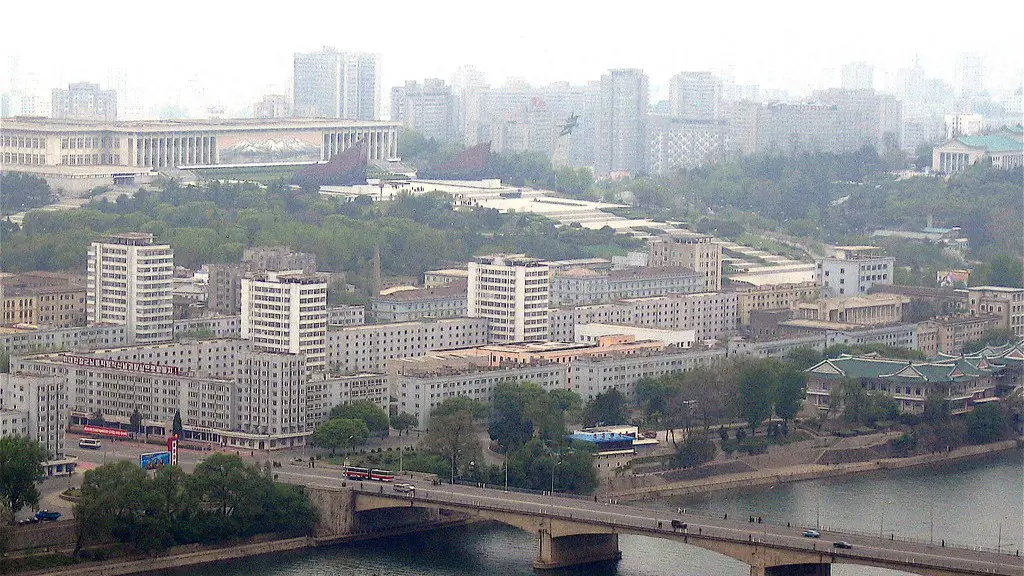The North Korean regime has been a major international concern for many decades. From its human rights abuses, to its provocative stance on foreign and military policy, it is clear that the policies of North Korea demand a response from the world. In the United States, the decision of President Donald Trump to send a high-level delegation to meet with North Korean leader Kim Jong Un has raised the possibility that the United States may enter into direct negotiations with North Korea.
The history between the United States and North Korea has been one of tension and mistrust. During the Cold War, North Korea was supported by the Soviet Union, while the United States backed South Korea. After the end of the Cold War, the United States and its allies have been monitoring the activities of North Korea, particularly its nuclear program. Over the years, the situation has deteriorated, with both sides accusing each other of provocation.
In order to deal with the North Korean situation, the United States and its allies must engage in dialogue. According to former US Secretary of Defense William Perry, “the only way to reduce the threat posed by North Korea is through direct negotiations with the leadership in Pyongyang.” Engaging the regime in dialogue will not only allow the United States to better understand the motivations of the North Korean government, but also provide an opportunity to convince them to abandon their pursuit of nuclear weapons. A negotiated settlement is the only way to achieve a lasting peace on the Korean peninsula.
The United States also has the option of imposing economic sanctions on North Korea. These punitive measures would put severe economic pressure on the regime and may make it more willing to negotiate. However, this approach carries the risk of damaging the lives of ordinary North Korean citizens, and it is unlikely that any governmental concessions made in response to sanctions will be permanent. Additionally, it may lead to greater hostility between North Korea and the US.
Apart from dialogue and sanctions, the United States can consider taking a more proactive stance in North Korean matters. The establishment of a joint US-South Korea working group on North Korean issues could provide a platform for the two countries to exchange information and coordinate policies. Similarly, increased economic aid from the United States could help to improve the standard of living in North Korea and create incentives for the government to change its policies.
Another approach is for the United States to recognize North Korea as an independent nation. Doing so would be a major step forward in normalizing diplomatic ties between the two countries. In addition, the United States could offer certain economic incentives to North Korea in exchange for steps taken to reduce its military threat. These could include increased aid, access to technology, and better diplomatic relations.
Highlighting the Humanitarian Crisis
One of the most overlooked aspects of the North Korea situation is the extensive humanitarian crisis taking place in the country. Severe food shortages, a crumbling infrastructure and human rights abuses have created a dire situation in North Korea, prompting many to flee the country in search of better opportunities. The United States and its allies should work toward providing more targeted aid to North Korea, such as food, medicine and educational supplies, as well as advocating for an end to the government’s repression of its citizens.
The United States can take a lead role in helping to bring about positive change in North Korea. It could pressure the regime to improve its deplorable human rights record and work with other countries to provide humanitarian aid and support to the North Korean people. In addition, the United States could use diplomatic and economic leverage to encourage North Korea to abandon its nuclear weapons program and pursue a more responsible foreign policy.
Engagement from the Regional Players
As North Korea is a regional issue, diplomatic engagement from its neighboring countries is also essential for resolving the conflicts with North Korea. China, Japan and South Korea are key countries who must be willing to cooperate with the United States in dealing with North Korea’s hostile behavior. All three countries have their own interests in North Korea, while also being vulnerable to the repercussions of an unstable and militant North Korea. Consequently, they must be part of any negotiations and consultations between the United States and North Korea.
China has the most influence and leverage over North Korea. As North Korea’s primary trading partner and largest source of foreign aid, China is in a unique position to pressure the North Korean government to compromise. China could also use its diplomatic ties to the United Nations Security Council to pass a resolution that would impose harsher economic sanctions on North Korea.
The role of Japan is important, both politically and economically. Japan is a close ally of the United States and provides economic and military aid to South Korea and the region. As such, Japan is in a good position to influence North Korean policy. Japan also has a vested interest in maintaining peace in Northeast Asia and a desire to see an end to the nuclear crisis in North Korea.
Finally, South Korea has an important role to play. As a neighbor of North Korea and a member of the United Nations, South Korea’s participation in potential negotiations with North Korea must be taken into account. South Korea has repeatedly expressed its willingness to engage in dialogue with North Korea on issues such as human rights and the denuclearization of the Korean peninsula. South Korea also provides humanitarian aid and has taken steps to promote regional cooperation and stability.
The US Military’s Role
The United States must consider the potential implications of a military confrontation with North Korea. A war on the Korean peninsula would be devastating to the region and cause immense casualties on both sides. The costs of a war could also extend beyond the region, as North Korea has close ties with China and Russia. Such a conflict would also have profound economic and political ramifications for the entire world.
The United States must always maintain a strong military posture in the region as a deterrence to any hostile acts by North Korea. Military security should also be coupled with diplomatic initiatives, as there must be a balance between the diplomatic and military approaches in order to find a lasting solution. The United States should also work with its allies in the region to define a clear strategy for dealing with North Korea.
The United States must also be willing to use diplomacy and negotiation as tools to achieve a resolution to the North Korean crisis. It is essential that the United States engage in dialogue in order to reach an agreement with North Korea that will benefit both parties. The United States must also be willing to accept some concessions in order to move towards a resolution. Ultimately, the United States must be willing to take a long-term approach and use all available diplomatic and economic tools to bring about a lasting peace in the region.
The Role of the UN and International Community
The United Nations (UN) and the international community have an essential role to play in finding a diplomatic solution to the North Korea crisis. The UN Security Council has endorsed many sanctions against North Korea and has called for the resumption of negotiations. The UN has also sent joint envoys to North Korea in order to encourage dialogue between the parties.
The United States should also seek the cooperation of the international community in addressing the North Korea crisis. Every global power has an interest in resolving this issue. The international community should work together to exert pressure on North Korea and to help create a conducive environment for dialogue between the United States and North Korea to take place.
The United States should also make use of international organizations such as the Association of Southeast Asian Nations (ASEAN), the European Union, and the United Nations, to strengthen diplomatic efforts towards addressing the North Korea crisis. These organizations are important multipliers of influence and can help to build a consensus among the international community. In addition, they can provide a platform for dialogue between the United States and other regional powers on matters related to the North Korean situation.
The United States must keep in mind that there is no single solution to the North Korea crisis. Any solution must involve a comprehensive and coordinated strategy involving the United States, its allies, regional powers, and members of the international community.finding a diplomatic resolution to the North Korean situation will require considerable diplomatic and economic investment, as well as sustained dialogue and coordination among all of the involved actors.




